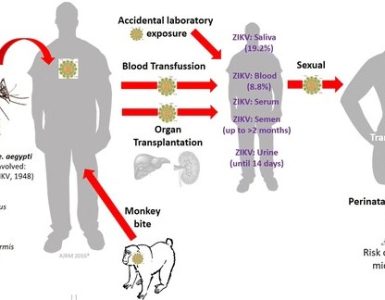
In a significant move to combat the Covid-19 pandemic, the U.S. government agreed to support a controversial proposal to temporarily waive intellectual property rights for vaccines in a bid to increase global supplies of desperately needed doses.
The proposal, which was first introduced before the World Trade Organization last fall by South Africa and India, would cover patents, industrial designs, copyrights, and protection of trade secrets. Ultimately, a waiver would make it easier for countries that permit compulsory licensing to allow a manufacturer to export vaccines. The move came amid growing concern that low- and middle-income countries were being left out after wealthy nations reached deals with vaccine makers.
“This is a global health crisis, and the extraordinary circumstances of the Covid-19 pandemic call for extraordinary measures. The administration believes strongly in intellectual property protections, but in service of ending this pandemic, supports the waiver of those protections for Covid-19 vaccines,” said U.S. Trade Representative Katherine Tai in a statement. She added the administration will “actively participate in text-based negotiations at the World Trade Organization needed to make that happen,” but cautioned that “those negotiations will take time.”
The decision by the Biden administration comes after months of fruitless talks about the proposal before the WTO, where more than 100 low- and middle-income countries pushed to find ways to expand and speed vaccine production. Existing exemptions in international trade law do not permit countries to quickly or easily reproduce vaccines or distribute them to other low-income countries that lack manufacturing capabilities.
However, the proposal ran into stiff pushback from wealthy countries, including the U.S., and the pharmaceutical industry, which argued intellectual property is not a barrier to greater access. As drug makers view the issue, breaching patent rights — even temporarily — would remove needed incentives and threaten future innovation. The industry, which had urged the Biden administration to reject the WHO proposal, also argues that sharing confidential blueprints will not readily solve the global access problem.
To address access issues, the World Health Organization last year organized the COVAX program to arrange for access to 92 countries, but this would only cover about 20% of their populations. The U.S. has agreed to supply up to $4 billion to COVAX, and the program remains underfunded. Its proposed budget for last year and this year is $11.7 billion, but total contributions as of last month had only reached $8.6 billion.
Wealthy countries currently account for more than half of nearly 9 billion doses locked up in purchase agreements to date, according to the Duke Global Health Innovation Center. While some middle-income countries, such as Brazil and India, have vaccine development programs, low-income countries lack manufacturing and clinical testing capacity and are unable to participate in the deal-making process.
The inability to contain the coronavirus — especially if further variants take hold — will prevent the global economy from recovering. The International Chamber of Commerce Research Foundation has warned that the global economy stands to lose as much as $9.2 trillion if governments fail to ensure access to Covid-19 vaccines for what it called developing economies.
For its part, the International Federation of Pharmaceutical Manufacturers & Associations maintained major production scale-up poses numerous challenges not be easily addressed by every company. These include an adequate supply of key ingredients and complex, technical expertise for overcoming scientific and regulatory hurdles. Pfizer (PFE) and BioNTech (BNTX), as well as Moderna (MRNA), have “locked in a lot of raw materials” in order to make and deliver a combined 3 billion doses this year Evercore ISI analyst Umer Raffat wrote to investors.
“In the midst of a deadly pandemic, the Biden Administration has taken an unprecedented step that will undermine our global response to the pandemic and compromise safety. This decision will sow confusion between public and private partners, further weaken already strained supply chains and foster the proliferation of counterfeit vaccines,” said Stephen Ubl, who heads PhRMA, the U.S. industry trade group.
“This change in longstanding American policy will not save lives. It also flies in the face of President Biden’s stated policy of building up American infrastructure and creating jobs by handing over American innovations to countries looking to undermine our leadership in biomedical discovery. This decision does nothing to address the real challenges to getting more shots in arms, including last-mile distribution and limited availability of raw materials. These are the real challenges we face that this empty promise ignores.”
Nonetheless, the growing breach between rich and low-income countries posed a challenge for the Biden administration, which has been under growing pressure from Democrats and advocacy groups to support the WTO proposal. Earlier this week, dozens of Democrats from the House and Senate publicly urged the White House to take this step. Tai, in fact, had spent part of the past month meeting with different advocacy groups in response to criticism that the administration position threatened to impede the fight against the pandemic.
“By recognizing that the best way to end the deadly global vaccine shortage is to enable more manufacturers to make vaccines, this waiver will save lives,” said U.S. Rep. Lloyd Doggett (D-Texas), the House Ways and Means Health Subcommittee chair. “With this waiver, we can share vaccine recipes, largely developed with taxpayer dollars, while assuring reasonable royalties to American manufacturers.”
As Tai noted, however, there is no assurance the proposal will pass the WTO. The U.S. was not the only wealthy nation to have objected — other wealthy nations that have resisted the measure include the U.K., Japan, and Switzerland, as well as the European Union. So it remains to be seen whether the Biden administration can persuade others. A decision on granting the waiver is not expected until next month.
Health advocates, nonetheless, were hopeful.
“This is a precedent-setting moment that shows the United States prioritizes saving lives above all else,” said Tahir Amin, co-executive director of I-MAK, a nonprofit that studies drug patents. “As someone who has worked on the ground in low- and middle-income countries, I have witnessed first-hand the immense capacity to quickly produce mass quantities of life-saving drugs and vaccines. It is urgent that knowledge is shared with these countries expeditiously to stem any further loss of life.”
“This is a necessary first step from the Biden administration, but text based negotiations must not drag on indefinitely, should not be limited to vaccines only,” said Health GAP Executive Director Asia Russell. “Already, 2.2 million people have died of COVID-19 since the waiver was proposed in October 2020. … Biden must double down on this recognition that circumstances call for extraordinary measures by quickly bringing pharma to the table to compel them to share technology and by using all resources at his disposal to fund increased manufacturing capacity in the Global South.”
Source: STAT

















